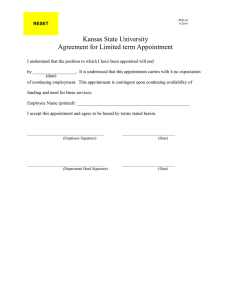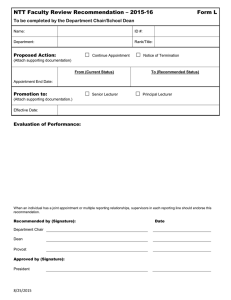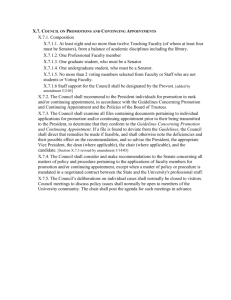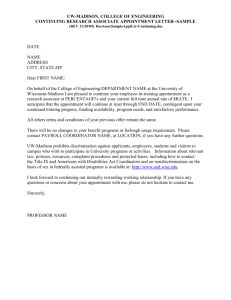Guidelines for Preparation of Recommendations Academic Affairs For Promotions and Continuing Appointment
advertisement
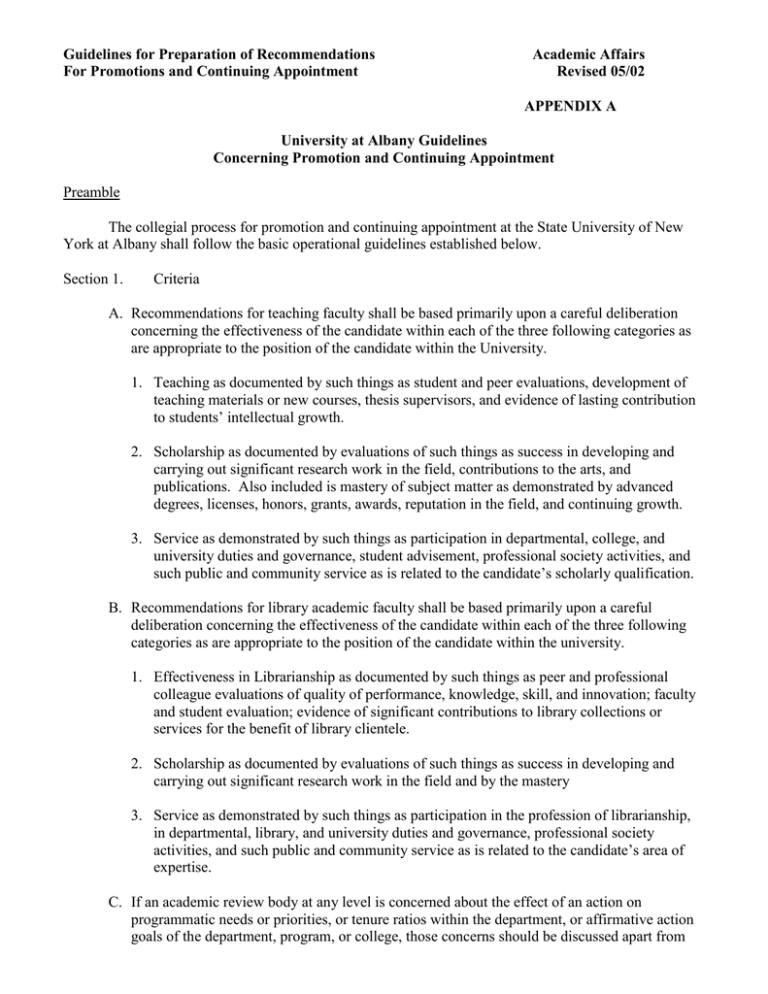
Guidelines for Preparation of Recommendations For Promotions and Continuing Appointment Academic Affairs Revised 05/02 APPENDIX A University at Albany Guidelines Concerning Promotion and Continuing Appointment Preamble The collegial process for promotion and continuing appointment at the State University of New York at Albany shall follow the basic operational guidelines established below. Section 1. Criteria A. Recommendations for teaching faculty shall be based primarily upon a careful deliberation concerning the effectiveness of the candidate within each of the three following categories as are appropriate to the position of the candidate within the University. 1. Teaching as documented by such things as student and peer evaluations, development of teaching materials or new courses, thesis supervisors, and evidence of lasting contribution to students’ intellectual growth. 2. Scholarship as documented by evaluations of such things as success in developing and carrying out significant research work in the field, contributions to the arts, and publications. Also included is mastery of subject matter as demonstrated by advanced degrees, licenses, honors, grants, awards, reputation in the field, and continuing growth. 3. Service as demonstrated by such things as participation in departmental, college, and university duties and governance, student advisement, professional society activities, and such public and community service as is related to the candidate’s scholarly qualification. B. Recommendations for library academic faculty shall be based primarily upon a careful deliberation concerning the effectiveness of the candidate within each of the three following categories as are appropriate to the position of the candidate within the university. 1. Effectiveness in Librarianship as documented by such things as peer and professional colleague evaluations of quality of performance, knowledge, skill, and innovation; faculty and student evaluation; evidence of significant contributions to library collections or services for the benefit of library clientele. 2. Scholarship as documented by evaluations of such things as success in developing and carrying out significant research work in the field and by the mastery 3. Service as demonstrated by such things as participation in the profession of librarianship, in departmental, library, and university duties and governance, professional society activities, and such public and community service as is related to the candidate’s area of expertise. C. If an academic review body at any level is concerned about the effect of an action on programmatic needs or priorities, or tenure ratios within the department, or affirmative action goals of the department, program, or college, those concerns should be discussed apart from Guidelines for Preparation of Recommendations For Promotions and Continuing Appointment Academic Affairs Revised 05/02 APPENDIX A the criteria in Section A, with the discussion to be recorded and included as information in the candidate’s file. D. No other evaluative category shall be deemed appropriate. Section II. Promotion in Academic Rank Promotion is available to the faculty in accordance with the provisions of the Policies of the Board of Trustees, Article X11, Title B. No minimum length of service in any academic rank shall be required for promotion. Promotion carries with in no commitment of continuing appointment. Section III. Continuing Appointment Continuing appointment is available to faculty in accordance with the provisions of the Policies of the Board of Trustees, Article XI (Appointment of Employees), Title B (Continuing Appointment). A continuing appointment carries with it no commitment about future promotions or salary increases. Section IV. Administrative Procedures and Responsibilities A. Definition of Levels of Academic Review 1. Throughout this section the term “department” shall mean the academic unit which constitutes the “initial academic review committee” as defined in the current union agreement. In the cases of the Library, the initial academic review is constituted by all members of the library academic faculty acting as a committee of the whole. 2a. In those schools or colleges having more than two academic departments, the “subsequent academic review committee” shall be the school or college promotion and continuing appointment review body. For all cases of promotion and continuing appointment, when a member of the candidate’s department of primary appointment is also a member of the school or college’s personnel committee, such individual will be excluded from school or college personnel committee meetings at which the candidate’s case is being considered. 2b. In those schools or colleges having fewer than three academic departments, and in the cases of the Library, the Council on Promotions and Continuing Appointments shall be the “subsequent academic review committee”. B. Department 1. The Chair (in the case of the Library, the Dean of the Library Faculty is understood to be the chair) shall inform a faculty member that he/she is being considered for a promotion and/or continuing appointment when the process of assembling evidence is initiated. The chair (Dean of Library Faculty) shall make sure that all evidence in the case is presented to the members of the department, as well as the dean. Guidelines for Preparation of Recommendations For Promotions and Continuing Appointment Academic Affairs Revised 05/02 APPENDIX A 2. Any faculty member may request a department to initiate action for promotion and/or continuing appointment of a faculty member, including herself/himself, provided that this request has the written approval of the prospective candidate. 3. An important datum in the case of the teaching faculty for the decision on promotion and/or continuing appointment is information about how students view the teaching of a faculty member. However, for this information to be of value, it must be collected in a systematic way. The department shall provide such information consistent with the following requirements: a. All students shall be given an opportunity to make an evaluation in every class each term. b. The evaluation form shall not be signed by the student. c. Summaries of student evaluations shall be available for review by all levels involved in recommendations concerning promotion and continuing appointment. An explanation sheet describing the process and procedures for these evaluations shall be included. 4. In support of the department’s preparation of a request for promotion and/or continuing appointment, the candidate shall be responsible for the preparation of a current vita in accordance with the annual memorandum (administrative guidelines) circulated by the Vice President for Academic Affairs. The vita shall be dated and signed by the candidate. 5. In preparing a candidate’s file, the department shall include material and information such as: letters from outside expert referees, review of work, reprint citations, letter from publishers (especially in the case of as yet unpublished work), qualified evaluation of unpublished work, instructional materials, copies or detailed descriptions of work completed or in progress, professional and service citations. 6. Every effort shall be made to consult all members of the department in all cases of promotion and/or continuing appointment. In a case of continuing appointment, separate votes of the departmental members holding continuing appointment and of the non-tenured faculty members are to be taken. All of these votes are to be conducted by secret ballot. Voting shall occur during departmental meetings only by those present. The departmental recommendation shall include the results of these votes and a summary of the discussion. The summary shall be approved by the members of the department. 7. The chair shall write a recommendation which must include reference to all categories in Section I. 8. Copies of the department’s recommendation and the chair’ recommendation shall be made available to the candidate who shall have the opportunity in reply in writing to the dean, such reply becoming a part of the record. C. School or College Guidelines for Preparation of Recommendations For Promotions and Continuing Appointment Academic Affairs Revised 05/02 APPENDIX A 1. The dean of each school or college shall examine each recommendation transmitted to her/him by the department to verify that the rules of Sections I and IV-B have been observed. 2. A subsequent academic review committee as defined in Section IV-A-2 above, shall review the materials provided by the department and chair and shall forward its own recommendation to the dean, the chair and the candidate. 3. The dean of the school or college shall review the case and transmit all materials to the Vice President for Academic Affairs, along with his/her own recommendation. 4. A copy of the dean’s recommendation shall be provided to the chair and the candidate. The candidate shall have the opportunity to reply in writing to the Vice President for Academic Affairs, such reply becoming a part of the record. D. Council on Promotions and Continuing Appointments 1. The Council shall examine recommendation transmitted to it to verify that the rules of Sections I and IV-B and C have been observed and shall make its own recommendation. 2. The Council shall transmit its recommendations to the Vice President for Academic Affairs with copies furnished to the dean, chair and the candidate. 3. The Vice President for Academic Affairs shall review the case and transmit all materials to the President along with his/her own recommendation. Copies of this recommendation shall be furnished to the dean, chair and the candidate. E. Personal Presentations by a Candidate A candidate for promotion and/or continuing appointment may appear at this/her option, before his/her department, before his/her school committee, or before the Council on Promotions and Continuing Appointments. F. Notification of Faculty Member The action of the President in each case shall be communicated to the faculty member involved on or about May 1. G. Withdrawal of Candidacy A candidate for promotion and/or continuing appointment may elect to withdraw his/her candidacy at any time by submitting a written request to his/her chair. A letter of resignation by a candidate shall be interpreted as a withdrawal of his/her candidacy. Section V. Initial Appointment Guidelines for Preparation of Recommendations For Promotions and Continuing Appointment Academic Affairs Revised 05/02 APPENDIX A If continuing appointment is recommended initially at any rank, all of the procedures outlined above for continuing appointment shall be followed. Section VI. Reconsideration After the Mandatory Year When a member of the faculty has been considered for continuing appointment in the mandatory year and a negative decision has been rendered, this action should be considered final. Exceptional circumstances may cause a candidate to feel that substantial new evidence justifies reconsideration of his/her case. In such exceptional circumstances, the following procedures shall apply. 1. The candidate must notify his/her department chair of his/her request for reconsideration no later than October 3. 2. The candidate shall provide the department with the new evidence no later than October 15. 3. The members of the department will meet to evaluate the new evidence. Only if the department concludes that the new evidence establishes a substantial change from the situation during the previous consideration will the case b reconsidered and votes taken as in an original consideration. If the reconsideration results in a negative vote by the faculty and a negative recommendation by the chair, the action is final, the request will not be forwarded for further consideration, and the president will be notified. If the reconsideration results in a positive recommendation by either the department or the chair, the recommendation for continuing appointment will be transmitted to the school or college. 4. When a positive recommendation is forwarded by a department, each subsequent level of review shall determine to its own satisfaction whether or not there is substantial new evidence warranting reconsideration. This determination will involve a comparison between the total record on which the University decision in the mandatory year was based and the new evidence, available since that decision date, presented by the candidate. 5. A decision at the school or college level not to reconsider shall be transmitted to the Council on Promotions and Continuing Appointments. The Council shall inform the President if it, in turn, declines to reconsider that case. 6. If the school or college, or the Council, concludes that there is substantial new evidence, it will then send forward in the usual manner its vote for or against continuing appointment. 7. Final actions including a department’s negative decision, will be communicated to the candidate by the President on or before November 17 of the reconsideration year. Section VII. Timeliness All recommendation shall be completed and transmitted in sufficient time for proper reviews, timely notifications to the candidate, and with regard to deadlines for non-renewal. (University Senate Bill No. 7980-32; amended by University Senate Bills Nos. 8283-09, 8687-17, 8990-28) Guidelines for Preparation of Recommendations For Promotions and Continuing Appointment Academic Affairs Revised 05/02 APPENDIX A
